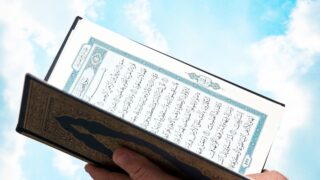One of the objectives of Qur’anic stories is to infuse Muslims with a spirit of endurance and to raise their morale. The Qur’an tells of an Israelite group whose children and homes were taken from them. They asked their prophet to name a leader to repel the enemy. In accordance with Allah’s command, their prophet named Talut (Saul) as their leader. The Israelites objected because Talut was not wealthy. However, his knowledge and strength were enough qualifications and, as their Prophet told them, it was Allah Almighty Who had selected him.
Sheikh Sayyid Qutb comments on the verses.
Despite the lack of narrative details, we can gather that Talut (Saul) had organized his fighting force of willing men and had gone ahead to do battle, and that as soon as they were on their way, their loyalty was put to the test.
[And when Saul set out with his troops, he said,”God will now put you to the test by a river. He who drinks from it will not belong to me, but he who does not taste its water will indeed belong to me, except him who takes a scoop with his hand.” They all drank [their fill] of it, except for a few of them.] (Al-Baqarah 2:249)
Saul was leading an army of a vanquished nation that had experienced defeat many times in its history. Hewas about to meet a formidable enemy and had, therefore, to test the will of his troops. He had to be sure of their ability to overcome their desires and endure hardship and deprivation. Above all, he had to test their loyalty and obedience, and their ability to shoulder responsibility. He put them to the test at the river, having established that they were getting very thirsty, to find out who would obey him and who would not.
[They all drank [their fill] of it, except for a few of them] (Al-Baqarah 2:249)
He allowed them a single scoop with the hand to quench their thirst, but most of them drank their fill and were left behind because they had failed the test. It was better for the rest of the fighting force, as weaklings would have been a liability on the battlefield. Military prowess is not determined by size or numbers, but is measured by the will and moral strength and faith of the troops.
This example shows that good intentions, by themselves, are not sufficient unless they are rested in practice. It also demonstrates the strength of a leader who is not swayed by the fall of most of his troops at the first hurdle, but who forges ahead with the rest of them.
Saul’s forces were to encounter more trials of loyalty and strength
[When he and those who kept faith with him crossed the river, they said, “No strength have we today to stand up to Goliath and his forces.”] (Al-Baqarah 2:249)
Their numbers had dwindled, and they were aware that they were outnumbered by Goliath’s forces. Certainly, they had the advantage of faith in their cause and trust in their leader, but the harsh reality of the situation told them they were the weaker side, and that their faith would be put to the test. Would that invisible force of faith triumph? How strong was their faith in God, and would they be able to harness that force in their favor and prevail?
At that decisive moment, a small group of true believers stood up to express their faith:
[But those of them who were certain that they would meet their Lord said, “How often has a small host triumphed over a large host by God’s grace. God is with those who remain patient (in adversity).”] (Al-Baqarah 2:249)
To the believer’s mind, that is the way it should be: Believers are always numerically less than their enemies because they need to sacrifice more and work harder to earn God’s grace and pleasure. But they triumph because they draw their strength from God Almighty and their faith in Him. The believers are aware that their victory comes from God as a reward for their patience and perseverance.
The surah goes on to confirm that, despite their material disadvantage, the small, devoted, faithful band of believers prevailed and overran their formidable enemy:
[And when they came face to face with Goliath and his troops, they prayed, “Our Lord, grant us patience, make firm our steps, and grant us victory over the unbelievers.” They routed them, by God’s will. David slew Goliath, and God bestowed on him the kingdom and wisdom, and taught him whatever He willed.] (Al-Baqarah 2:250-251)
Their prayers are deeply sincere and poignant. The Arabic words depict patience as an endless shower poured down upon the believers by God Almighty, filling their hearts with reassurance and tranquility and providing them with the power and energy to face their superior enemy. They plead for strength to stand firm and to triumph over their adversary. It was clearly a confrontation between truth and falsehood in which God’s intervention was indispensable to ensure a decisive victory for His allies.
And so it was: (They routed them, by God’s will). The emphasis here is on “God’s will” in order to reassure the believers, and to establish that what goes on in this world is determined and controlled by this will. Believers are only the means by which God’s will comes to pass. They are His servants, with little power of their own, chosen to perform a certain predestined role in the universal divine scheme. Believers are granted this privileged status through the grace of God and as a result of their sincerity, their determination to serve God, and their unstinted devotion to Him.
[David slew Goliath, and God bestowed on him the kingdom and wisdom, and taught him whatever He willed.] (Al-Baqarah 2:251)
At the time of these events, David was a young man and Goliath a powerful king and a fearful commander, but God wished to demonstrate to the Israelites that they should not judge matters at face value, and should look deeper into the reality of things. Their side of the bargain was to keep their pact with God and prepare themselves for battle, leaving the rest to God, Who knows the essence of all things and how they come about. The outcome would be decided by God, in accordance with His will and wisdom. It was God’s will that a youth such as David should slay a powerful giant-of-a-man such as Goliath as proof that physical power by itself is not the decisive factor.
The other divine objective, not obvious at the time, was that David was destined to inherit the kingdom of Saul, and that David would be succeeded by his son, Solomon, who reigned over what became the golden era in the whole history of the Israelites, a period of great religious revival that came after their return from the wilderness.

















